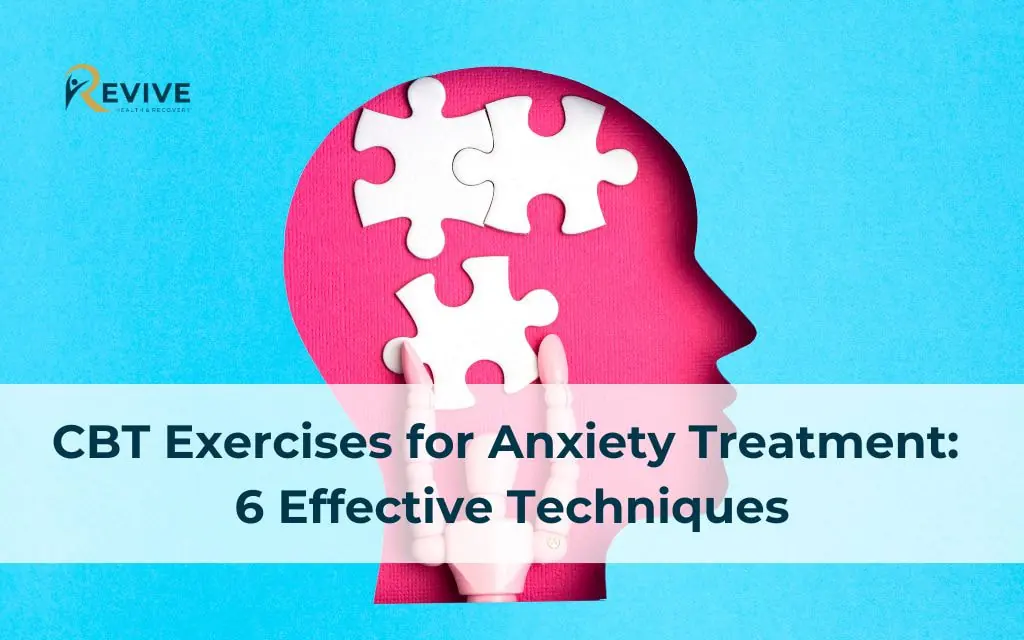Cognitive Behavioral Therapy (CBT) stands as one of the most effective evidence-based treatments for anxiety disorders. If you’re struggling with anxiety, practicing CBT exercises for Anxiety Treatment can help you manage symptoms, challenge negative thought patterns, and regain control of your life. Many individuals in search of support turn to an Anxiety Treatment Center in Denver, where specialized CBT programs offer structured techniques for long-term relief.
Whether you’re dealing with generalized anxiety, social anxiety, or panic disorder, finding the right anxiety disorder treatment is crucial. In Denver, you can explore CBT anxiety treatment programs, connect with experienced therapists, and learn proven strategies like cognitive restructuring, exposure therapy, and relaxation techniques. Understanding how these exercises work can empower you to take the first step toward recovery.
What is Cognitive Behavioral Therapy (CBT)?
Cognitive Behavioral Therapy represents a structured, goal-oriented therapeutic approach focused on examining the relationships between thoughts, feelings, and behaviors. This practical methodology helps patients recognize how negative thought patterns influence emotions and actions, creating a cycle that perpetuates anxiety.
The foundation of CBT rests on the understanding that thoughts drive emotions and behaviors. By identifying distorted thinking patterns, individuals learn to challenge and replace irrational thoughts with realistic ones, reducing anxiety symptoms. These Cognitive Behavioral Therapy (CBT) techniques have transformed anxiety treatment approaches nationwide, including Denver.
Historical Background About Cognitive Behavioral Therapy
Dr. Aaron Beck developed CBT in the 1960s as a treatment for depression, but practitioners quickly recognized its effectiveness for anxiety disorders. Dr. Albert Ellis contributed significantly to the field with his rational emotive behavior therapy, which shares core principles with modern CBT approaches. Over decades, researchers have refined these techniques, establishing CBT as the gold standard for anxiety treatment. The American Psychological Association formally endorses CBT based on extensive clinical research demonstrating its effectiveness.
The Beck Institute for Cognitive Behavior Therapy continues to advance the field through research and training. CBT has evolved from a purely cognitive approach to incorporate mindfulness, acceptance strategies, and advanced behavioral techniques, broadening its application across various mental health conditions.
CBT Techniques Used for Anxiety Treatment
Cognitive Restructuring for Anxiety
Cognitive restructuring addresses the distorted thinking patterns that fuel anxiety. Common cognitive distortions include:
- Catastrophizing: Anticipating the worst possible outcome
- Overgeneralization: Applying one negative experience to all situations
- Black-and-white thinking: Viewing situations as entirely good or bad with no middle ground
During therapy sessions, practitioners guide patients to identify these thought patterns and question their validity. For example, a thought record exercise helps track automatic negative thoughts, emotional responses, and evidence that contradicts these thoughts. Through consistent practice, patients develop the ability to generate alternative, balanced perspectives automatically.

Exposure Therapy for Anxiety
Exposure therapy systematically confronts anxiety-provoking situations or stimuli in a controlled environment. This technique operates on the principle that avoidance maintains anxiety, while controlled exposure diminishes fear responses over time.
The process typically begins with creating an anxiety hierarchy—ranking situations from least to most anxiety-provoking. Therapists then guide patients through gradual exposure to these situations, starting with lower-anxiety items and progressing upward as comfort increases.
For instance, someone with social anxiety might start by imagining a social interaction, then progress to role-playing with their therapist, followed by engaging in brief social encounters, and finally participating in extended social events. This methodical approach builds confidence while reducing anxiety symptoms.
Relaxation Techniques for Anxiety
CBT incorporates various relaxation strategies to address the physical manifestations of anxiety like CBT exercises for anxiety treatment:
Progressive muscle relaxation involves systematically tensing and releasing muscle groups to reduce physical tension. Deep breathing exercises regulate the body’s stress response by activating the parasympathetic nervous system. Guided imagery utilizes visualization of peaceful scenes to induce relaxation.
These physiological interventions complement cognitive techniques, creating a comprehensive approach to anxiety management. Regular practice transforms these strategies into automatic responses to anxiety triggers.
CBT Exercises for Social Anxiety
#1: Identifying Social Triggers
Effectively managing social anxiety begins with recognizing specific triggers. Common social anxiety triggers include public speaking, group conversations, workplace interactions, and social gatherings.
CBT exercises for anxiety treatment practitioners recommend maintaining a detailed anxiety journal to track triggering situations, accompanying thoughts, physical sensations, and subsequent behaviors. This documentation reveals patterns and provides crucial information for developing targeted interventions.
This self-monitoring process enhances self-awareness and serves as a foundation for subsequent CBT exercises for social anxiety in Denver treatment programs.
#2: Role-Playing and Social Skills Training
Role-playing recreates anxiety-provoking social scenarios in the safety of the therapeutic environment. This technique allows patients to practice responses to feared situations while receiving immediate feedback and guidance from their therapist.
Social skills training addresses specific communication deficits that may contribute to social anxiety. Therapists teach and demonstrate effective communication strategies, such as maintaining appropriate eye contact, asking open-ended questions, and active listening.
The ultimate goal involves transferring these skills to real-world situations through graduated exposure assignments, ensuring skills generalize beyond the therapy setting.

#3: Cognitive Restructuring in Social Contexts
Social anxiety often stems from distorted thoughts about others’ perceptions. CBT helps challenge these assumptions by examining evidence for and against these thoughts.
For example, the thought “Everyone at this party is judging me” transforms to “Most people are focused on themselves rather than judging me” through evidence-based evaluation. Patients learn to recognize common cognitive distortions in social settings and develop more balanced thinking patterns.
This cognitive work reduces anticipatory anxiety before social events and diminishes rumination afterward, breaking the cycle of social avoidance.
Benefits of CBT for Anxiety Treatment in Denver
Effectiveness of CBT
Clinical research consistently demonstrates CBT’s effectiveness for anxiety disorders. Meta-analyses show that approximately 60-80% of patients experience significant symptom reduction following a standard CBT protocol.
When compared to medication, CBT produces comparable short-term results with superior long-term outcomes. While medications may provide faster initial relief, CBT equips patients with skills that prevent relapse, making it a sustainable treatment option.
Denver’s healthcare community has embraced evidence-based approaches, with numerous practitioners specializing in CBT exercises for anxiety treatment. The benefits of CBT for anxiety treatment in Denver extend beyond symptom reduction to include improved quality of life and enhanced coping skills.
Long-Term Outcomes
CBT’s enduring effectiveness stems from its focus on skill development rather than symptom suppression. Patients acquire concrete strategies they can implement independently, reducing reliance on ongoing therapy.
Follow-up studies indicate that CBT benefits often maintain or even increase after treatment concludes. Many patients report continued improvement as they apply CBT principles to new situations.
At Revive Health Recovery, we’ve witnessed countless success stories from Denver residents who have transformed their relationship with anxiety through CBT. Many individuals who previously avoided activities due to anxiety now engage fully in work, social, and recreational pursuits.

Accessibility in Denver
Denver boasts a robust mental health community with numerous therapists trained in CBT approaches especially in CBT exercises for anxiety treatment. The city’s emphasis on health and wellness extends to mental healthcare, creating a supportive environment for those seeking anxiety treatment.
Multiple clinics throughout Denver, including Revive Health Recovery, specialize in evidence-based anxiety treatments. From downtown to the surrounding suburbs, quality CBT services exist throughout the metropolitan area.
Finding CBT Therapists and Programs in Denver
Specialized Clinics
Revive Health Recovery stands as a premier destination for anxiety treatment in Denver. Our center combines evidence-based approaches with personalized care, addressing both mental health challenges and substance use concerns that often accompany anxiety disorders.
Several other specialized clinics in Denver offer anxiety-focused programs, though program structure, therapeutic approach, and practitioner qualifications vary significantly. Research each option thoroughly to find the best fit for your needs.
Considerations When Choosing a Therapist
When selecting a CBT therapist for anxiety treatment, evaluate:
- Credentials: Look for licensed psychologists, social workers, or counselors with specific training in CBT
- Experience: Consider the therapist’s history treating your specific anxiety condition
- Therapeutic approach: Confirm the therapist utilizes evidence-based CBT techniques
- Communication style: Ensure you feel comfortable and understood during consultations
- Practical factors: Consider location, scheduling availability, and session format (in-person vs. telehealth)
Cost of CBT Therapy for Anxiety in Denver
Average Costs
Therapy costs vary based on provider credentials, session length, and practice setting. Rather than focusing on specific price points, recognize that many treatment centers, including Revive Health Recovery, offer CBT exercises for anxiety treatment with flexible payment structures tailored to individual circumstances. Our commitment to accessibility means working with patients to find sustainable financial solutions.
Insurance Coverage
Many Denver providers accept insurance for CBT treatment. Revive Health Recovery partners with numerous insurance companies to minimize out-of-pocket expenses. Our team assists with insurance verification, helping patients understand their coverage and maximize their benefits.
Contact our admissions team for a complimentary insurance benefits check to determine your coverage for anxiety treatment services.
Low-Cost Options
Revive Health Recovery believes quality mental healthcare should be accessible to all Denver residents. We offer various pricing structures to accommodate different financial situations, including sliding scale fees based on income.
Beyond our center, Denver provides community mental health resources for those requiring reduced-cost treatment options. Our team can help connect individuals with appropriate resources if our services don’t align with financial constraints.
FAQs About CBT for Anxiety
How long does CBT treatment typically last?
Most CBT protocols require 8-20 sessions depending on anxiety severity. At Revive Health Recovery, we customize treatment length while maintaining CBT’s focused, goal-oriented approach.
Can I practice CBT techniques on my own?
Self-help resources exist, but professional guidance ensures proper implementation. Revive Health Recovery provides between-session resources alongside professional support.
How quickly will I see results from CBT?
Initial improvements typically emerge within 3-4 weeks, with significant symptom reduction after 2-3 months of consistent practice.
Does CBT work for severe anxiety disorders?
Yes. Research confirms CBT’s effectiveness across all anxiety severity levels. For severe cases, Revive Health Recovery offers integrated approaches that may initially combine CBT with medication.
Conclusion
Cognitive Behavioral Therapy offers a scientifically-validated path to anxiety relief through practical skills development and thought pattern modification. Denver residents have access to exceptional CBT exercises for anxiety treatment resources, with Revive Health Recovery representing a trusted provider of comprehensive anxiety treatment services.
The journey toward anxiety management begins with a single step – reaching out for professional support. Our team at Revive Health Recovery stands ready to guide Denver residents through evidence-based treatment tailored to individual needs. Experience the transformative power of CBT in a supportive, healing environment focused on lasting recovery.
Don’t let anxiety dictate your life’s boundaries. Contact Revive Health Recovery today to schedule a consultation with our experienced team of anxiety specialists. Together, we’ll develop a personalized treatment plan incorporating proven CBT techniques for sustainable anxiety relief.



